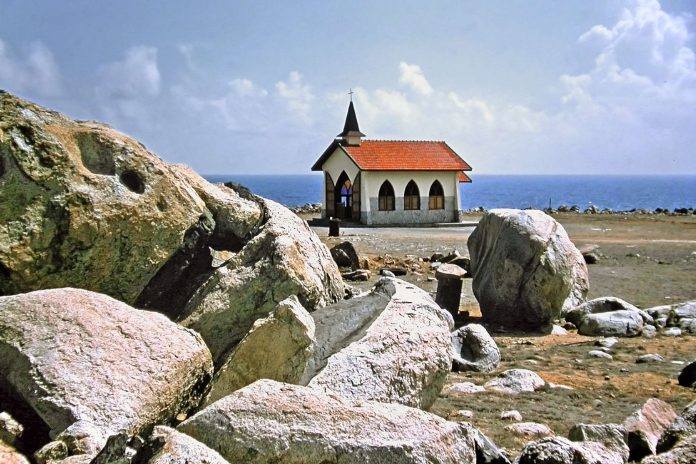According to Etnia Nativa, in the 18th century most of the inhabitants of Aruba were indigenous who lived on the north coast, one of the largest communities lived in Alto Vista.
As they were very religious, they had a chief with the name of Antonio Silvester who guided them in the Christian life and it was he who decided to build a stone chapel with a roof of corn rods, which would serve as a place of prayer. In 1750 it was blessed by Father Algamesi who came from Coro-Venezuela and appointed Domingo Antonio Silvester as the island’s first prosecutor in the name of the Spanish crown and Rome. In 1752 the prosecution passed into the hands of Antonio Silvester’s son-in-law, Miguel Álvarez, who continued to guide the parishioners in their prayers.
According to the book, The History of Alto Vista by R.H. Nooyen, it is not known when Domingo Antonio Silvester came to Aruba from Venezuela. The elders believe Antonio was a Spaniard. In 1780, father Joseph Antonio de la Vegal called Bernardino Silvester, one of Antonio’s sons with his wife Anna Cathalina Tromp, “neighbors and naturals of the island Aruba” and thus they became natives.
At the end of the eighteen century many inhabitants the island died as a result of the black fever epidemic and since people believed that the Alto Vista area was the most infected, they began to build their homes further south within the Noord area, so the town of Noord began to grow into a community till getting its own Church. However religious festivals continued to be celebrated at this sacred native place, with the custom of arriving in procession to Alto Vista.
Two-hundred years after the beautiful time of Alto Vista, people can no longer see much of the town of Alto Vista from 1750. With a lot of work they found the old foundations of the Church of the Queen of the Holiest Rosary to build a new chapel on the same place. The entire surrounding area was empty and desolated, making it hard to imagine that Alto Vista was a town at all. A hundred years later, people can see the remains of around twenty houses, some made of stone and others of clay. Nowadays, only around six of these houses remain.
South of the chapel in the yard two graves can be observed, there was the cemetery which father Pablo de Algemesi blessed. It is not certain, but it is believed that the two graves belong to Antonio Silvester and Miguel Alvares, according to Nooyen. About 50 meters near the chapel there are still the markings of an old house, where Antonio and Bernardino Silvester would have lived. About 200 meters from the chapel there is a water tank which the locals call Tanki Cacique. In the past this tank was closed. But mostly water was brought out from the Poz di Noord, a well dug in the sand.
The chapel can be viewed from basically any point in the north side, even from Paradera and Sero Plat. All the historical remains around the chapel provide us with an idea on how the old people of Alto Vista used to live. Don’t miss the opportunity to visit a place of historical significance with a window to Aruba’s past.
















